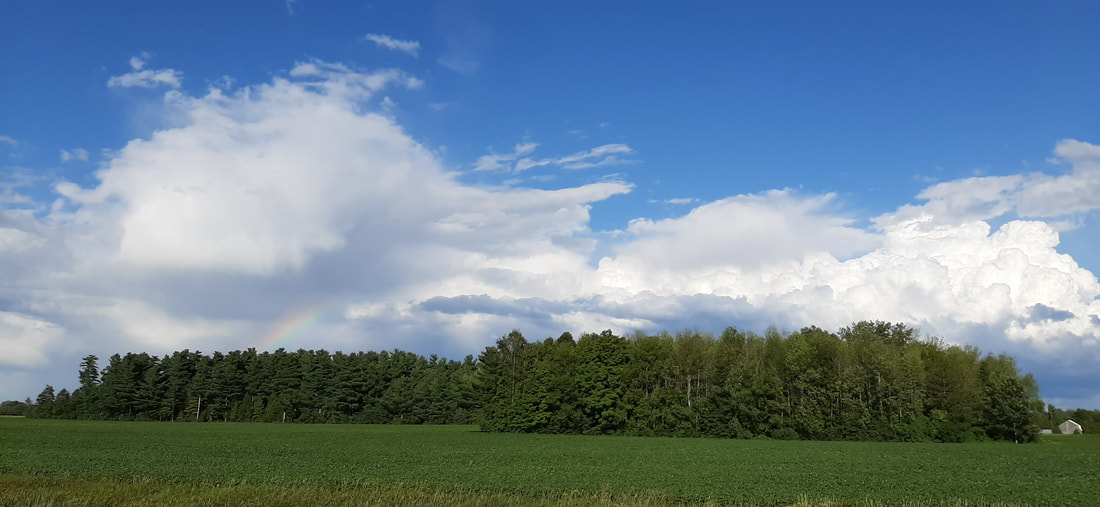|
«Elle comprenait seulement que rien n’est plus fort que cet instinct de revenir là où on nous a brisé, et de répéter cet instant pendant des années. En pensant seulement que ce qui nous a sauvé une fois pourra nous sauver à jamais.»
Alessandro Baricco, Sans sang Even though I only live an hour away from my family, I hadn’t seen them in eight months. The pandemic was to blame, of course, but even at the best of times I would only go see them every few months. There is that no public transport goes to Lacolle. More importantly, there is that I have really bad FOMO. I saw about 300 artists in concert last year. But COVID cured me of that. Now I can be in Lacolle without thinking about all the things I’m missing because there is no longer anything to miss. The pandemic has taken with it all of the advantages of living in the city and left only its inconveniences: too many people everywhere and too little of anything else anywhere. It was the best time I had at my parents’ since the summers before I first moved out when I was nineteen. Why the summers? Because, free from going to school, I was alone. Reading by the pool. Listening to music as loud as I wanted since our closest neighbours lived 350 metres away. (I MISS THIS. Maybe my love for concerts has been little more than an attempt to recreate this, which would partially explain why I tend to prefer underattended shows.) Reading in the bathtub. Watching movies. I’d bought a TV with the money I made working on the farm so I could watch movies in my room after everyone had gone to bed. In the winter, its light would sometimes reveal a mouse travelling through the house at night. A few days later, we would inevitably find it in the trap in the kitchen closet. I remember I’d asked my mom to buy me a cup so disgustingly huge that the first one broke as she brought it home. I would fill it with hot chocolate that I would sip on as I read in bed. After the infamous ice storm of 1998, I dragged a twin mattress in the office downstairs, shoved it in a corner, and covered it with cushions and pillows. I would spend my days reading there. This time, I read five books in the fifteen days I was there. Reading on my parents’ balcony, I saw a hummingbird hovering over the bushes and a doe eating in the field across the street with its baby deer. Just like Marchbanks in George Bernard Shaw’s Candida, “I had my books. I had Nature.” The fewer humans there are, the more life there is. Because I had brought weed oil with me, it was the first time I was able to get stoned at my parents’ house. One such night, after they had gone to bed, on the way to my bedroom, my arms filled with snacks, a thought hit me: being high aside, here I was, finding solace in doing the same thing I had been doing over two decades before, in doing the same thing I had been doing ever since. My source of comfort had never been a person. And, if it was, that person was me. Being alone wasn’t something that had been done to me; it was something I had chosen. As Brittany Julious wrote in her own personal essay about solitude, “This solitariness was […] about doing the things I’ve always wanted to do. It was about being the person I’ve always wanted to be. It was about seeing things myself, staying curious, learning, laughing, confronting my fears, finding what I love and never letting go.” I don’t remember the movie I watched that night. But I know it was extra good.
0 Comments
 The Communist Manifesto, Karl Mark “You are horrified at our intending to do away with private property. But in your existing society, private property is already done away with for nine tenths of the population; its existence for the few is solely due to its non-existence in the hands of those nine tenths. You reproach us, therefore, with intending to do away with a form of property, the necessary condition for whose existence is the non-existence of any property for the immense majority of society.” Fear and Trembling, Amélie Nothomb “The accountants who spent ten hours a day copying out numbers were, to my mind, victims sacrificed on the altar of a divinity wholly bereft of either greatness or mystery. These humble creatures were devoting their entire lives to a reality beyond their grasp. In days gone by they might have at least believed there was some purpose to their servitude. Now they no longer had any illusions. They were giving up their lives for nothing, and they knew it. Everyone knows that Japan has the highest suicide rate of any country in the world. What surprised me was that suicides were not more common.” Putain, Nelly Arcan “[...] vous savez bien que je n'en voudrai pas de cet homme car je ne veux que ce que je ne peux pas avoir, comme vous par exemple, je vous veux parce je ne vous aurai jamais, c'est simple et sans issue, c'est désespérément logique, le désir qui ne connaît de réalité que lui-même, et vous voyez bien que je mérite la mort pour cet entêtement de rat qui ne sait pas rebrousser chemin, pour cet acharnement de bestiole aveugle qui finira par crever d'avoir trop avancé, vous verrez bien, je mourrai de ce compromis que je ne veux pas faire, et tant pis pour tous les hommes sains et équilibrés qui m'aimeront et tant pis pour moi surtout qui en aimerai d'autres, on finit tous par mourir de la discordance de nos amours.” How Should a Person Be?: A Novel, Sheila Heti “Most people live their entire lives with their clothes on, and even if they wanted to, couldn't take them off. Then there are those who cannot put them on. They are the ones who live their lives not just as people but as examples of people. They are destined to expose every part of themselves, so the rest of us can know what it means to be a human. Most people lead their private lives. They have been given a natural modesty that feels to them like morality, but it's not -- it's luck. They shake their heads at the people with their clothes off rather than learning about human life from their example, but they are wrong to act so superior. Some of us have to be naked, so the rest can be exempted by fate.” Ce samedi il pleuvait, Annick Lefebvre “Ma langue va se délier pis splasher de l’acide généalogique sur le beau patio de polymère synthétique de Ludovic. Je vais faire corps avec la scie à chaîne pis tronçonner le tricot familial maillé serré qui nous soude faussement sous prétexte que nos souches sont les mêmes. Ça va faire brailler Julie qui va se rendre compte qu’elle possède la faculté de se répandre par spasmes de sanglots libérateurs, entre un buzz de BlackBerry, une névrose cheap pis une brochette de crevettes thaï grillées à point.” Silk, Alessandro Baricco “And a while later: ‘It is a strange sort of pain.’ Softly. ‘To die of yearning for something you'll never experience.’” The Skin of Our Teeth, Thornton Wilder “I didn't marry you because you were perfect. I didn't even marry you because I loved you. I married you because you gave me a promise. That promise made up for your faults. And the promise I gave you made up for mine. Two imperfect people got married and it was the promise that made the marriage. And when our children were growing up, it wasn't a house that protected them; and it wasn't our love that protected them -- it was that promise.” Headlight Sixteen “I took a deep breath and closed my eyes. I thought of all the invisible particles that constituted the world, like a cloud of tiny little seahorses. The face of a princess embedded in the fading rays of the sun. I listened for my heartbeat. Closely. Nothing. Everything was fine.” -Atli Bollason, “Sandy’s Gallery” Candida, George Bernard Shaw “Wicked people means people who have no love: therefore they have no shame. They have the power to ask love because they don't need it: they have the power to offer it because they have none to give. (He collapses into his seat, and adds, mournfully) But we, who have love, and long to mingle it with the love of others: we cannot utter a word.” http://www.localgestures.com/3/post/2013/01/in-which-we-talk-to-ourselves-out-loud.html Scrivener Creative Review Presents: Teen Poetry @ Brutopia Let’s face it, most readings play like they’re put on by writers who’ve never been exposed to any other kind of performance, nor had the pleasure of Israel’s cock. The folks at Scrivener Creative Review had the brilliant idea of having writers read material from their teenage years. In retrospect, the angst-filled writings proved hilarious, causing the audience to burst into laughter more often than at any other reading I’ve ever attended. Which caused me to think: what’s the point of working so hard on so-called good writing if it gets less of a reaction than our less self-conscious teen musings? |
Sylvain Verstricht
has an MA in Film Studies and works in contemporary dance. His fiction has appeared in Headlight Anthology, Cactus Heart, and Birkensnake. Archives
October 2023
Categories
All
|

 RSS Feed
RSS Feed